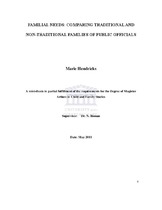Familial needs : comparing traditional and non-traditional families of public officials
Abstract
Participation of diverse families in familial needs studies, assist in understanding and comparing their descriptive account of their families and experiences today. This descriptive study compared traditional and non-traditional families of public officials with a focus on (1) form and income, (2) familial needs as per key propositions, (3) families perceptions/experiences at community and broader societal levels and (4) familial needs government must assist them with. The study was contextualized within a contemporary family discourse. It was primarily influenced by a feminist perspective as well as a critique of the nuclear or traditional family grounded in functionalist theory. The public official, as focus, was framed in a human rights and an employee assistance policy discourse influenced by the South African public service context. The study used a quantitative research paradigm, whereby a survey was implemented. The survey was administered to 600 public officials and culminated in a final sample of 70 participants. The study indicated that public officials, as members of families, live in both traditional and non-traditional families. Public officials have familial needs similar to any other family and are also influenced by similar factors in broader society. As both rights holders and duty bearers they can improve their own family lives and also serve families in broader society better. However they too need to be supported with their own family needs. Public officials suggested the areas in which they needed help from the Provincial Government of the Western Cape.

